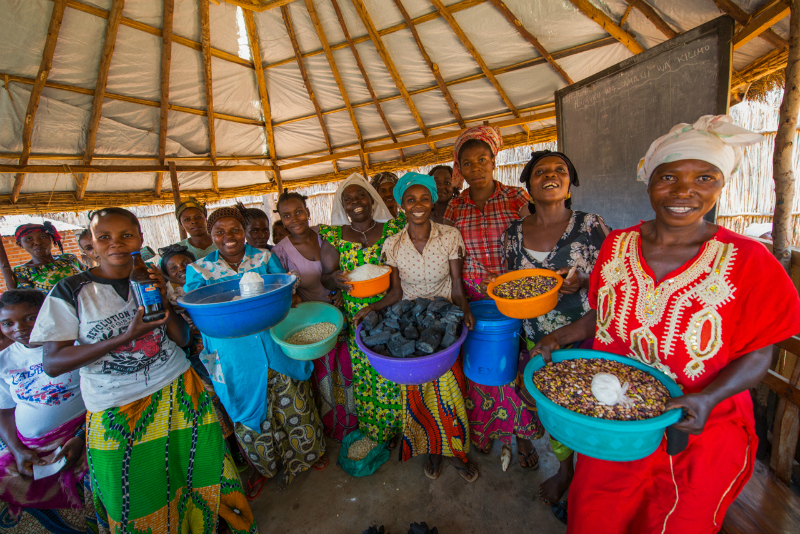As global leaders adopt a new development agenda, Women for Women International is sharing lessons with partners and allies to ensure women in the poorest countries are not left behind.
At conferences and side events in New York and Washington, D.C., our leadership tackled several topics key to making the #GlobalGoals a reality. Below are just a few of the many questions we've answered at events in the past month on how our work makes a difference for women:
What is the Role of Men in Moving Global Goals Forward?
"We cannot move forward alone as women - it has to be together with men," shared WfWI's Senior Director of Communications Amber Khan during a panel discussion on feminism and men at the Social Good Summit on September 28. Joining global rights activist and actress Freida Pinto and Mashable's Stacy Martinet, Khan explained how WfWI launched an innovative program bringing men together in the communities where we work. She described how the pilot programs effectively enlist men to promote women's empowerment in places like Afghanistan.
"A local elder outside of Jalalabad, after coming through our men's engagement training, realized he had a voice and the power to change," shared Khan. "The next time a man came to him to ask for permission to marry off his daughter for money, he said 'no.' He now sees he has an opportunity to change local attitudes."
Men like him embody what is possible when men stand up to be part of the solution and work with women to build communities that support their full equality.
>> Check out this story and other details about our work to engage men here. <<
What Innovations Will Create the World We Want?

In the DRC, graduates of our program hold a cell phone they bought together to help strengthen their businesses. The women have individual SIM cards and can use the phone to connect to new clients and markets, negotiate for lower prices, and save time.
"Simple technology like mobile phones can disrupt cycles of poverty and insecurity - and getting these into the hands of the most marginalized women requires innovative approaches," shared WfWI's Associate Director for Regional Economic Empowerment Veyrl Adell during a panel discussion focused on innovations for sustainable development hosted by the Guardian Development Professionals Network on September 22.
"We've learned that creating supportive environments for women and inspiring them to pursue their goals are what enable them to change their lives. In a pilot program in the DRC, we gave groups of women the opportunity to borrow cell phones for one week to see how they could use the technology to grow their businesses. When we followed up with them three months later, these same groups had pooled their resources to purchase a shared cell phone and individual SIM cards. They had seen how having a cell phone could transform business opportunities for them, and they came together to make it happen," shared Adell.
"Rather than just giving each woman a cell phone, we inspired women to purchase their own and helped bring women together in groups that enabled them to do so. The women were proud they could purchase a cell phone together. It gave them new confidence. Now they use their phones to negotiate lower prices for goods, arrange transportation to and from markets, and reach new clients. They're even working to connect with mobile money service providers so they can safely store their earnings. They save time and find new business opportunities."
Adell also brought these lessons to the SEEP Network Annual Conference during a panel discussion on how to promote women's participation in local, regional, and international trade with representatives from USAID and Banyan Global.
How Can Women Living in Extreme Poverty Access Economic Opportunity and Empowerment?

A WfWI-DRC graduate and mother of nine, Beatrice (blue) and members of her cooperative show the rice, beans, flour, and charcoal they sell to provide for their families. Photo Credit: Alison Wright
"Social empowerment is the foundation of economic empowerment, particularly for the poorest women who have survived conflict or war," shared WfWI's Director of Program Design and Development Anna Mecagni during a panel discussion on women's agency and economic empowerment at the SEEP Network Annual Conference on September 30.
"We know that women who survive conflict often struggle to deal with the trauma they have faced, alone and without support, which keeps them from moving forward," shared Mecagni. "Networks, like those created by our programs, can provide women critical emotional support. As women attend our trainings in groups of 25, they begin to open up to each other and realize they are not alone in their suffering. It is an important step to end their isolation."
"Too often, people think that social empowerment training is 'soft' and not likely to yield tangible results. But we think social empowerment strengthens women, and helps them overcome barriers to economic empowerment."
